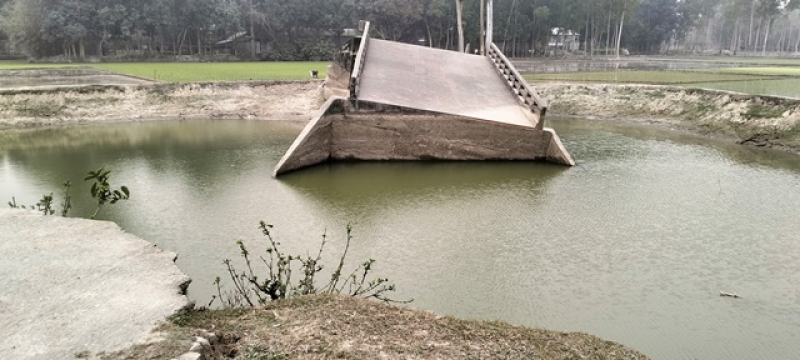- Power generation at Payra Thermal Power Plant 1st unit starts after a month |
- Irregularities, injustice will no longer be accepted in politics: Jamaat Ameer |
- 2 arrested in Jhenaidah for allegedly selling madrasa student |
- Koko’s wife campaigns for Tarique in Dhaka-17 |
- Bangladeshi Expats Cast 4.58 Lakh Postal Votes |
Kurigram villagers await bridge reconstruction after 5 years

A bridge in Kurigram that sank five years ago awaits reconstruction. UNB
Kurigram, Feb 1 – For over 100,000 residents of Ulipur upazila in Kurigram, daily life has been a relentless battle ever since two vital bridges were washed away by devastating floods in 2019.
The Amatoli Bridge and Chuniyar Par Bridge, which once connected multiple villages with the Kurigram-Chilmari Road, remain in ruins, leaving the communities they once served cut off from essential services and economic opportunities.
The consequences of this prolonged inaction have been dire. With no alternative crossings, vehicular movement has come to a halt, forcing villagers to walk long distances through difficult terrain.
Students, patients, traders and transport workers have been among the hardest hit, their daily struggles only worsening with each passing season.
A Road to Nowhere
The 6.5-kilometre stretch from Chuniyar Par to Ulipur Azmer Mor was constructed in 2015 at a cost of Tk 5.9 crore, including the two ill-fated bridges.
The project had been a beacon of progress, improving connectivity for the Brahmaputra River-bound eastern regions of Tabakpur, Dhamshreni, and parts of Chilmari upazila.
But when the floods struck, the bridges collapsed, rendering the entire road impassable and cutting off communication between the upazilas.
In a desperate bid to restore some semblance of connectivity, villagers initially built a makeshift bamboo footbridge.
Over time, this too succumbed to the elements. During the dry season, locals attempt to navigate fields, but when the monsoon rains arrive, movement becomes nearly impossible.
Lives on Hold
For many, the loss of the bridges has meant a loss of livelihood and education. “The road was a lifeline for us. When it was functional, rickshaws, CNG-run auto-rickshaws, and other vehicles moved freely. Now, we have no choice but to walk long distances,” lamented Rafiqul Islam, a resident of Bishnu Ballav village.
Students have been among the worst affected. Ariful Islam, a student of Ulipur Government Degree College, shared his struggles: “Our village has no secondary schools or colleges. The road made education accessible, but now many of us have been forced to drop out.”
Autorickshaw driver Abdul Khaleq has seen his earnings dwindle. “I used to earn a living by driving on this road. Now, I can barely make ends meet,” he said.
Local businesses have also suffered significantly. Akbar Ali, a trader at Amatoli Bazar, described the decline in commerce: “The market used to be bustling. But now, with connectivity cut off, business is down.”
A Plea for Action
Despite repeated appeals, no action has been taken to rebuild the bridges.
Tabakpur Union Parishad Chairman Mokhlesur Rahman expressed his frustration: “The road had solved many of our transportation problems. But the bridges’ collapse has pushed us back into hardship. Since being elected, I have repeatedly urged authorities for their reconstruction.”
Ulipur Upazila Executive Engineer Pradip Kumar confirmed that a proposal for the bridges’ reconstruction had been submitted to the head office. However, no response has been forthcoming, leaving residents in a seemingly endless state of uncertainty.
As yet another year passes without resolution, the people of Ulipur upazila remain trapped in isolation, their hopes tied to bureaucratic decisions that have yet to materialise.
Until action is taken, their daily struggle serves as a stark reminder of how vital infrastructure can be—and how devastating its absence is. - UNB

